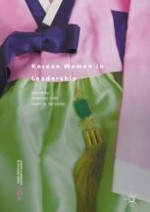2018 | OriginalPaper | Buchkapitel
2. Korean Women in Leadership: Family Roles
verfasst von : Eunsun Joo
Erschienen in: Korean Women in Leadership
Aktivieren Sie unsere intelligente Suche, um passende Fachinhalte oder Patente zu finden.
Wählen Sie Textabschnitte aus um mit Künstlicher Intelligenz passenden Patente zu finden. powered by
Markieren Sie Textabschnitte, um KI-gestützt weitere passende Inhalte zu finden. powered by
